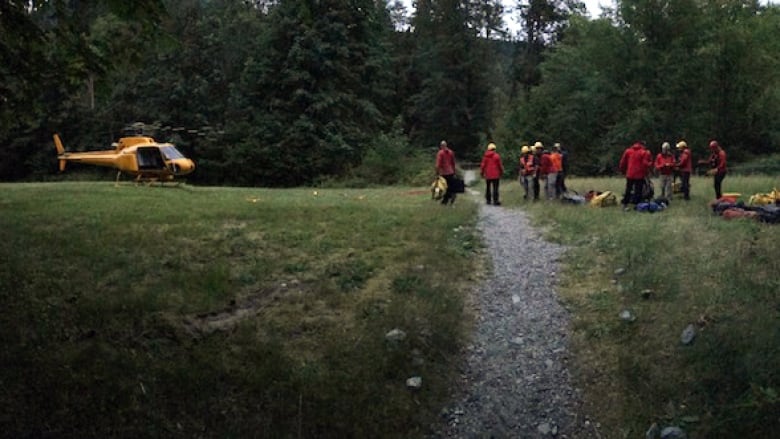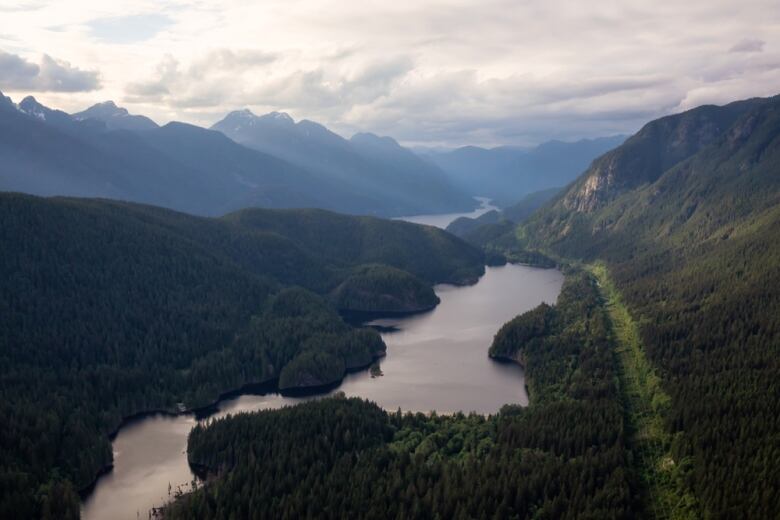Hiker rescued from waterfall ledge after companion, 16, dies in fall near Buntzen Lake
Search and rescue teams asked 'distraught' survivor to guide them to scene over phone

A 16-year-old hiker died in a fall and another hiker was rescued after the pair becamelost in theBuntzen Lake area on Wednesday.
Coquitlam Search and Rescue said the teenfellwhile the hikers were coming down a steepgully, trying to find their way out.
"One of them took a fall off some waterfalls,"said search manager RayNordstrand.
Theteendied at the scene.
Nordstrandtalked the surviving hiker through the rescue, helping him direct a helicopter to the metre-wide ledge under a waterfall where he waited for hours.
Stranded on slick ledge
It's believed the hikers set out to hike the Dilly Dally Loop around 9 a.m. PT on Wednesday.
The trail runs north to south, but Nordstrandsaid the pairgot lost and ended up on the west side of Eagle Mountain.
The search manager said the hikersdecided to try to follow a river back down to safety.
Both slipped and fell. The surviving hiker was left stranded on the slick ledge under the falls.
"Our guys couldn't stand up [when they reached him]. It was that much of a slope," Nordstrand said. "It's just slippery rock face."

'They were right over top of him'
The hiker was able to call 911 and connect with Nordstrand, who was using the search team's satellite phone.
"The surviving friend was quite distraught ...To get details was difficult," Nordstrand said.
"He was having a hard time understanding me. He said waterfalls were making too much noise. I asked him to move away, and he said 'I can only move three feet.'"
The search manager asked the hiker, hidden under trees and rock,to listen for the sound of a helicopter.
"I was asking, 'Is itlower than you? Is it higher? And we were finally able to get the helicopter to hover over him," Nordstrand said.
"Basically, they were right over top of him before they could even see him."
Both hikers were long-lined out of the area at dusk. The surviving hiker wastaken to hospital with minor injuries.
Neither his identity nor his age have been released.
'Terrible cellphone coverage'
BuntzenLake is a popular recreation areanorthofPort Moody, B.C. There is rarely cell service in the main parking lot, with spotty reception up the trails.
Michael Coyle, who also works with CoquitlamSAR, said the team thinks better cell service in the area would help future rescues.
"BuntzenLake itself has terrible cellphone coverage," he wrote in an email on Thursday.
"Over the years we've invested over $50,000 in equipment designed to boost the signal to our command centre, and it's still not reliable."

Nordstrand said the rescue could have ended in further tragedy if the hiker's cellphone hadn't worked.
"That was the only way we would've found him," he said. "He didn't have an issue making a cellphone call, but that's not always the case."
Both searchers said the "old-school" option of a map and compass is still best.
"The key message is, if you're going out in the backcountry, expect that you won't have cellphone service and plan accordingly," Nordstrand said.
The search manager passed on his team's condolences to the late hiker's friends and family.
"It's a tough time," he said.
With files from Yvette Brend












_(720p).jpg)


 OFFICIAL HD MUSIC VIDEO.jpg)
.jpg)



























































































